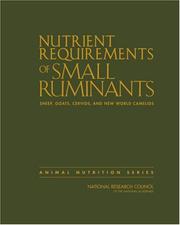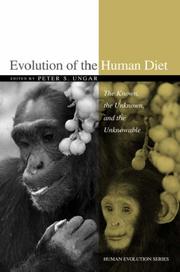| Listing 1 - 7 of 7 |
Sort by
|
Book
ISBN: 9788776020651 8776020657 Year: 2007 Publisher: Copenhagen National Museum of Denmark
Abstract | Keywords | Export | Availability | Bookmark
 Loading...
Loading...Choose an application
- Reference Manager
- EndNote
- RefWorks (Direct export to RefWorks)
Food habits --- Feeding Behavior --- Food --- Diet --- History, Medieval --- Plants, Edible --- History --- ethnology --- history --- history --- Europe.

ISBN: 0226772659 1281966568 9786611966560 9780226772653 9780226772639 0226772632 9780226772646 0226772640 9781281966568 6611966560 Year: 2007 Publisher: Chicago : University of Chicago Press,
Abstract | Keywords | Export | Availability | Bookmark
 Loading...
Loading...Choose an application
- Reference Manager
- EndNote
- RefWorks (Direct export to RefWorks)
Foraging is fundamental to animal survival and reproduction, yet it is much more than a simple matter of finding food; it is a biological imperative. Animals must find and consume resources to succeed, and they make extraordinary efforts to do so. For instance, pythons rarely eat, but when they do, their meals are large-as much as 60 percent larger than their own bodies. The snake's digestive system is normally dormant, but during digestion metabolic rates can increase fortyfold. A python digesting quietly on the forest floor has the metabolic rate of thoroughbred in a dead heat
Animals --- Animal diets --- Animal feeding behavior --- Animal food --- Animal food habits --- Animal foods --- Animals, Food habits of --- Feeding behavior in animals --- Food habits in animals --- Food of wild animals --- Foraging behavior in animals --- Animal behavior --- Food --- Food. --- Feeding behavior --- Food habits --- Foods --- Foraging behavior --- ecology, ecological, behavior, behavioral, evolution, evolutionary, biology, sciences, scientific, biological, imperative, foraging, foragers, cognitive science, anthropology, conservation, economics, neurobiology, technology, cognition, population, community, mammals, amphibians, food, eating, survival, neuroethology, energy storage, social interactions, diversity, dynamics, free distribution, provisioning, animals, wildlife.

ISBN: 1107160200 1280909579 9786610909575 0511286368 0511285620 0511284055 0511489676 0511321724 0511284853 0521827876 0521535107 Year: 2007 Publisher: Cambridge : Cambridge University Press,
Abstract | Keywords | Export | Availability | Bookmark
 Loading...
Loading...Choose an application
- Reference Manager
- EndNote
- RefWorks (Direct export to RefWorks)
The Nutritional Psychology of Childhood is a systematic account of research on the psychological aspects of nutrition in children from birth to adolescence. It deals with two major themes: the development of eating and the effects of malnutrition on the developing child. Robert Drewett discusses the developmental problems that arise with eating and food intake, including nursing and weaning in infancy, the handling of solids and the development of food choice and eating habits. Nutritional problems are considered in children born preterm or small for gestational age, or whose growth is poor, in children who are iron deficient or more generally malnourished, and in children with physical illnesses, including phenylketonuria and cerebral palsy. The development of eating disorders and obesity are also considered. Drawing on research from both developing and industrialised countries, this book will be of interest to students, researchers and professionals in psychology, nutrition and child health.
Children --- Infants --- Eating disorders in children. --- Babies --- Infancy --- Child psychopathology --- Child feeding behavior --- Children's eating habits --- Children's food habits --- Food habits --- Nutrition --- School children --- Psychological aspects. --- Psychological aspects --- Food --- Health Sciences --- Psychiatry & Psychology

ISBN: 9780521535106 9780511489679 9780521827874 Year: 2007 Publisher: Cambridge Cambridge University Press
Abstract | Keywords | Export | Availability | Bookmark
 Loading...
Loading...Choose an application
- Reference Manager
- EndNote
- RefWorks (Direct export to RefWorks)
Children --- Eating disorders in children --- Infants --- 159.922.7 --- Babies --- Infancy --- Child psychopathology --- Childhood --- Kids (Children) --- Pedology (Child study) --- Youngsters --- Age groups --- Families --- Life cycle, Human --- 159.922.7 Kinderpsychologie --- Kinderpsychologie --- Nutrition&delete& --- Psychological aspects --- Nutrition --- Child feeding behavior --- Children's eating habits --- Children's food habits --- Food habits --- School children --- Food

ISBN: 9780309102131 0309102138 0309660998 9780309660990 Year: 2007 Publisher: Washington National academies press
Abstract | Keywords | Export | Availability | Bookmark
 Loading...
Loading...Choose an application
- Reference Manager
- EndNote
- RefWorks (Direct export to RefWorks)
Animal Feed. --- Ruminants --- Zoology and Animal Sciences. Farm and Captive Animals --- Feeding and feeds. --- Nutrition --- Requirements. --- physiology. --- Small Ruminants (Sheep and Goats). --- 636.084.4 --- 636.294 --- 636.296 --- 636.32/.38 --- 636.39 --- Ruminant mammals --- Ruminantia --- Artiodactyla --- 636.39 Goats --- Goats --- 636.32/.38 Sheep --- Sheep --- 636.296 Other Camelidae. Llama --- Other Camelidae. Llama --- 636.294 Deer. Reindeer --- Deer. Reindeer --- 636.084.4 Various questions of feeding and nutrition generally --- Various questions of feeding and nutrition generally --- Feeding and feeds --- Nutrition&delete& --- Requirements --- Animal nutrition physiology --- Camelids, new world --- Deer --- Diet --- Feeding behavior --- physiology --- veterinary

ISBN: 9780387303345 0387303340 9786610938056 1280938056 0387454616 Year: 2007 Publisher: New York, NY : Springer US : Imprint: Springer,
Abstract | Keywords | Export | Availability | Bookmark
 Loading...
Loading...Choose an application
- Reference Manager
- EndNote
- RefWorks (Direct export to RefWorks)
The Quest for Food: A Natural History of Eating is a collection of essays that surveys eating through time, from the perspective of a biologist. The quest begins in prehistoric times with religion and the exploration of the connection between food and sex. This leads to an investigation of the deep links between food and culture, exploring the basic question of "what is eating?" The second section embarks on a biochemistry-oriented journey tracing the path of a food molecule through the central carbon pathway until it is decomposed into CO2, H2O and ATP. The third section delves into the evolution of eating systems, beginning with the elements of the primordial soup through the birth of single cell organisms such as bacteria and archea. We then follow this evolution in the fourth section through higher developed organisms: from the first organisms in the ocean to the ones on land. The next two sections explore the stories of food from an ecological, then behavioral viewpoint, leading the reader from animals to early hominids, and into human history. The final section takes apart an anthropocentric view of the world by presenting man as prey for the oldest predators: microbes. The text closes with an agronomical outlook on how to feed the billions. The goal of The Quest for Food is to catalyze discussions between scientists working in food science, and those in biological and biomedical research. About the Author: Harald Brüssow is a Senior Research Scientist at Nestle Research Centre's Nutritional Health Department, in Lausanne, Switzerland.
Food --- Microorganisms --- Organisms --- Bioenergetics --- Photosynthesis --- Microbial metabolism --- Aliments --- Micro-organismes --- Organismes --- Bioénergétique --- Photosynthèse --- Bactéries --- History. --- Histoire --- Métabolisme --- Bioenergetics -- History. --- Food -- History. --- Food supply -- History. --- Microbial metabolism -- History. --- Microorganisms -- History. --- Organisms -- History. --- Photosynthesis -- History. --- Eating --- Feeding Behavior --- Food Supply --- Metabolism --- Food and Beverages --- Behavior --- Metabolic Phenomena --- Digestive System Processes --- Nutrition Processes --- Behavior, Animal --- Food Industry --- Industry --- Technology, Industry, Agriculture --- Digestive System Physiological Phenomena --- Nutritional Physiological Phenomena --- Physiological Processes --- Phenomena and Processes --- Behavior and Behavior Mechanisms --- Digestive System and Oral Physiological Phenomena --- Technology, Industry, and Agriculture --- Physiological Phenomena --- Psychiatry and Psychology --- Diet & Clinical Nutrition --- Biomedical Engineering --- Health & Biological Sciences --- History --- Bioénergétique --- Photosynthèse --- Bactéries --- Métabolisme --- EPUB-LIV-FT LIVCHIMI SPRINGER-B --- Bacterial metabolism --- Metabolism, Bacterial --- Energy balance (Biology) --- Energy budget (Biology) --- Energy dynamics (Ecology) --- Energy utilization (Biology) --- Biological organisms --- Biota --- Living organisms --- Germs --- Micro-organisms --- Microbes --- Microscopic organisms --- Chemistry. --- Microbiology. --- Anthropology. --- Food Science. --- History, general. --- Biotechnology. --- Photobiology --- Plants --- Gases from plants --- Biochemistry --- Energy budget (Geophysics) --- Life (Biology) --- Species --- Microbiology --- Physiology --- Effect of light on --- Photorespiration --- Food science. --- Human beings --- Annals --- Auxiliary sciences of history --- Microbial biology --- Biology --- Science --- Food—Biotechnology. --- Primitive societies --- Social sciences

ISBN: 9780195183474 9780195183467 0195183479 0195183460 0195346017 9786612235122 1280907908 0198040474 1429469021 1282235125 9780198040477 9780195346015 9781429469029 9786610907908 6610907900 0197712916 Year: 2007 Publisher: Oxford New York Oxford University Press
Abstract | Keywords | Export | Availability | Bookmark
 Loading...
Loading...Choose an application
- Reference Manager
- EndNote
- RefWorks (Direct export to RefWorks)
I. Introduction. 1. Early Hominin Diets: Overview and Historical Perspectives, Alan Walker. 2. Whose Diet? An Introduction to the Hominin Fossil Record, Amanda G. Henry and Bernard Wood. II. The Hominin Fossil Record. 3. The Evolution of the Hominin Diet from a Dental Functional Perspective, Peter W. Lucas. 4. Dental Functional Morphology: The Known, the Unknown, and the Unknowable, Peter S. Unger. 5. What Do We Know and Not Know about Diet and Enamel Structure, Mark F. Teaford. 6. Mandibular Biomechanics and the Paleontolgical Evidence for the Evolution of Human Diet, David J. Daegling and Fr
Prehistoric peoples --- Fossil hominids --- Human remains (Archaeology) --- Animal remains (Archaeology) --- Dental anthropology --- Teeth, Fossil --- Diet --- Homme préhistorique --- Homme fossile --- Restes humains (Archéologie) --- Restes d'animaux (Archéologie) --- Anthropologie dentaire --- Dents fossiles --- Alimentation --- Food --- History --- Histoire --- Dental anthropology. --- Diet. --- Fossil hominids. --- Human remains (Archaeology). --- Prehistoric peoples. --- Teeth, Fossil. --- Paleodontology --- Biological Evolution --- Paleontology --- Feeding Behavior --- Hominidae --- Genetic Processes --- Behavior --- Behavior, Animal --- Investigative Techniques --- Nutritional Physiological Phenomena --- Anthropology, Physical --- Biological Processes --- Earth Sciences --- Catarrhini --- Haplorhini --- Anthropology --- Analytical, Diagnostic and Therapeutic Techniques and Equipment --- Behavior and Behavior Mechanisms --- Physiological Phenomena --- Natural Science Disciplines --- Genetic Phenomena --- Biological Phenomena --- Social Sciences --- Disciplines and Occupations --- Phenomena and Processes --- Psychiatry and Psychology --- Primates --- Mammals --- Anthropology, Education, Sociology and Social Phenomena --- Vertebrates --- Chordata --- Animals --- Eukaryota --- Organisms --- Physical Anthropology --- Science, Social --- Sciences, Social --- Social Science --- Biologic Phenomena --- Biological Phenomenon --- Biological Process --- Phenomena, Biological --- Phenomena, Biologic --- Phenomenon, Biological --- Process, Biological --- Processes, Biological --- Genetic Concepts --- Genetic Phenomenon --- Genetic Process --- Concept, Genetic --- Concepts, Genetic --- Genetic Concept --- Phenomena, Genetic --- Phenomenon, Genetic --- Process, Genetic --- Processes, Genetic --- Molecular Biology --- Natural Sciences --- Physical Sciences --- Discipline, Natural Science --- Disciplines, Natural Science --- Natural Science --- Natural Science Discipline --- Physical Science --- Science, Natural --- Science, Physical --- Sciences, Natural --- Sciences, Physical --- Physiological Concepts --- Physiological Phenomenon --- Physiological Process --- Physiological Processes --- Concept, Physiological --- Concepts, Physiological --- Phenomena, Physiological --- Phenomenas, Physiological --- Phenomenon, Physiological --- Physiological Concept --- Process, Physiological --- Processes, Physiological --- Anthropoids --- Anthropoidea --- Monkeys --- Monkey --- Earth Science --- Geoscience --- Geosciences --- Science, Earth --- Sciences, Earth --- Nutrition Phenomena --- Nutrition Physiological Concepts --- Nutrition Physiological Phenomenon --- Nutrition Process --- Nutritional Phenomena --- Nutritional Physiological Phenomenon --- Nutritional Physiology --- Nutritional Physiology Concepts --- Nutritional Physiology Phenomenon --- Nutritional Process --- Nutritional Processes --- Nutrition Physiological Phenomena --- Nutrition Physiology --- Nutrition Processes --- Nutritional Physiology Phenomena --- Concept, Nutrition Physiological --- Concept, Nutritional Physiology --- Concepts, Nutrition Physiological --- Concepts, Nutritional Physiology --- Nutrition Physiological Concept --- Nutritional Physiology Concept --- Phenomena, Nutrition --- Phenomena, Nutrition Physiological --- Phenomena, Nutritional --- Phenomena, Nutritional Physiological --- Phenomena, Nutritional Physiology --- Phenomenon, Nutrition Physiological --- Phenomenon, Nutritional Physiological --- Phenomenon, Nutritional Physiology --- Physiological Concept, Nutrition --- Physiological Concepts, Nutrition --- Physiological Phenomena, Nutrition --- Physiological Phenomena, Nutritional --- Physiological Phenomenon, Nutrition --- Physiological Phenomenon, Nutritional --- Physiology Concept, Nutritional --- Physiology Concepts, Nutritional --- Physiology Phenomena, Nutritional --- Physiology Phenomenon, Nutritional --- Physiology, Nutrition --- Physiology, Nutritional --- Process, Nutrition --- Process, Nutritional --- Processes, Nutrition --- Processes, Nutritional --- Nutritional Sciences --- Phototrophic Processes --- Autotrophic Processes --- Heterotrophic Processes --- Chemoautotrophic Growth --- Investigative Technics --- Investigative Technic --- Investigative Technique --- Technic, Investigative --- Technics, Investigative --- Technique, Investigative --- Techniques, Investigative --- Animal Behavior --- Animal Behaviors --- Behaviors, Animal --- Ethology --- Acceptance Process --- Acceptance Processes --- Behaviors --- Process, Acceptance --- Processes, Acceptance --- Hominini --- Pongidae --- Apes --- Hominids --- Hominins --- Homo --- Ape --- Hominid --- Hominin --- Homininus --- Diet Habits --- Eating Habits --- Dietary Habits --- Eating Behavior --- Feeding Patterns --- Food Habits --- Behavior, Eating --- Behavior, Feeding --- Behaviors, Eating --- Behaviors, Feeding --- Diet Habit --- Dietary Habit --- Eating Behaviors --- Eating Habit --- Feeding Behaviors --- Feeding Pattern --- Food Habit --- Habit, Diet --- Habit, Dietary --- Habit, Eating --- Habit, Food --- Habits, Diet --- Habits, Dietary --- Habits, Eating --- Habits, Food --- Pattern, Feeding --- Patterns, Feeding --- Nutrition Disorders --- Phylogeography --- Diets --- Early man --- Fossil hominins --- Fossil man --- Hominids, Fossil --- Hominins, Fossil --- Human fossils --- Primates, Fossil --- Paleoanthropology --- Agriculture, Prehistoric --- Evolution, Biological --- Sociobiology --- Tooth --- Health --- Food habits --- Nutrition --- Fossil teeth --- Dentition --- Physical anthropology --- Teeth --- Skeletal remains (Archaeology) --- Human skeleton --- Primate remains (Archaeology) --- Eucarya --- Eukarya --- Eukaryotes --- Eukaryotas --- Eukaryote --- Animalia --- Animal --- Metazoa --- Chordates --- Chordate --- Vertebrate --- Mammalia --- Mammal --- Primate --- Bioarchaeology --- Behavior And Behavior Mechanism --- Autotomy Animal --- Feeding-Related Behavior --- Behavior, Feeding-Related --- Feeding Related Behavior --- Feeding-Related Behaviors --- Paleontology. --- Biological Evolution. --- Feeding Behavior. --- Hominidae. --- history. --- methods. --- Primitive societies --- Taphonomy
| Listing 1 - 7 of 7 |
Sort by
|

 Search
Search Feedback
Feedback About
About Help
Help News
News